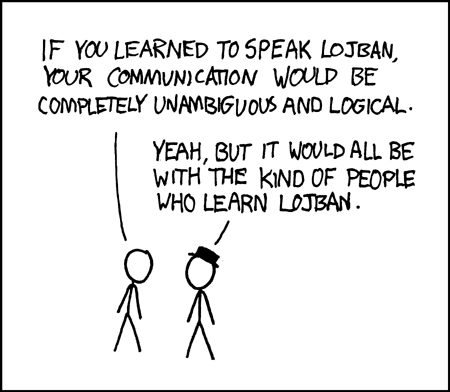191: Lojban
| Lojban |
 Title text: zo'o ta jitfa .i .e'o xu do pendo mi |
Explanation[edit]
Lojban is a constructed language designed to be logical, unambiguous, and culturally neutral — similar to the better known artificial language Esperanto. The authors originally designed it as an experiment, but a few people have picked it up and tried to learn it. However, anyone actually willing to learn Lojban is someone Black Hat would rather avoid. Alternately, only people who speak Lojban, who compose an admittedly tiny proportion of the general population, could benefit from the logic of the language, making the benefits of Lojban mostly pointless to most people.
Clicking on the original comic brings you to a Lojban translation of the comic. The Lojban version literally translates to something like:
- Cueball: Hypothetically, you becoming an expert in Lojban implies things you say would completely be an unambiguous meaning and logical.
- Black Hat: Agreed, but would be talking to the people subgroup that is an expert in Lojban.
If reading pedantically, a few mistakes can be identified:
- "Hypothetically" is applied to the entire first sentence rather than the subclause "you are an expert in Lojban".
- The word "pavysmu" is used in a way that indicates the things being said are an unambiguous meaning, rather than having a single meaning.
- The subgroup of people is specified as being an expert in Lojban, not the people in it.
The title text is also written in Lojban. It translates roughly as: "That was a joke. Really. Wanna be friends with me?" Since Lojban aims to be completely unambiguous, idiomatic structures like sarcasm and humor have associated particles - when a joke is made, it must be explicitly marked as such or else it's incorrect. Most languages rely on intonation expressing this, but Lojban does not, leading to the strange practice here of specifically pointing out that a joke was made.
A more literal translation gives: "Humorously that false. Please is-it-true-that you friend me?"
The lojban word {xekce} (shortened from {xekcedipasopa}, or XKCD-191), is based on this comic, referring to a particular Lojbanic cultural phenomenon in which discussions in or about Lojban tend to quickly turn into arguing over grammar, semantics, or usage.
Transcript[edit]
- [Cueball and Black Hat are having a conversation.]
- [English version:]
- Cueball: If you learned to speak Lojban, your communication would be completely unambiguous and logical.
- Black Hat: Yeah, but it would all be with the kind of people who learn Lojban.
- [Lojban version:]
- Cueball: da'i ganai do crebi'o la lojban gi le se cusku be do cu mulno pavysmu je logji
- Black Hat: .i .ie ku'i cusku fi le prenu klesi poi certu la lojban
Discussion
https://www.youtube.com/watch?v=IRsPheErBj8 --79.67.240.72 16:02, 28 February 2013 (UTC)
- What can we learn from this? - I've learned that unless you share your knowledge with others, the rest of your life will be very lonely and no one will understand you. - E-inspired (talk) 16:11, 28 February 2013 (UTC)
- What can we learn from 79.67.240.72? - That insults have no meaning, after you declaw them with reason. (Thank you Mr. 79.67.240.72) - E-inspired (talk) 16:15, 28 February 2013 (UTC)
I did change the transcript to the words from the Lojban picture posted here. What the hell was this former text:
la .kiubal. cusku lu da'i ganai do crebi'o la lojban gi le se cusku be do cu mulno pavysmu je logji li'u .i la .xekrimapku. cusku lu .i .ie ku'i cusku fi le prenu klesi poi certu la lojban li'u
--Dgbrt (talk) 17:38, 15 October 2013 (UTC)
- That's how a transcript would be written in a Lojban text; {.kiubal.}, for instance, is a Lojbanisation of "cueball", and {lu} and {li'u} are open/close quotation marks. It would have been right if this wiki was in Lojban, but since it's in English, it's debatable. I guess the current version is easier for the readership to read. 141.101.98.225 13:14, 5 November 2013 (UTC)
- I would be happy if you could do an explain on this. I just did check the transcript, and I am not native Lojban ;). So, if there are any important differences, it has to be explained here. --Dgbrt (talk) 20:56, 5 November 2013 (UTC)
- This also could mean changing the transcript again, but then it has to be explained.--Dgbrt (talk) 20:58, 5 November 2013 (UTC)
- It also was not correct, as .xekrimapku. is not a legal cmene. Maybe "xekrimapuk."? 173.245.54.40 01:25, 17 March 2016 (UTC)
I would really like to know which of the two alternative interpretations given in the entry text is actually supported by the Lojban translation, though... being a proclaimed unambiguous language and all 162.158.83.210 18:56, 12 October 2016 (UTC)
162.158.83.210, Lojban is syntactically unambiguous. It is not, and does not claim to be, semantically unambiguous. I don't think that's even possible. Even if Lojban was semantically unambiguous, there would still be multiple ways to translate it into English, another semantically ambiguous language. 172.68.174.82 (talk) (please sign your comments with ~~~~)
They should call a problem like this the Lojban Effect 162.158.79.245 01:42, 24 August 2019 (UTC)
somehow it seems like {xekce} should be mentioned somewhere on this page 172.68.73.32 22:32, 14 May 2023 (UTC)